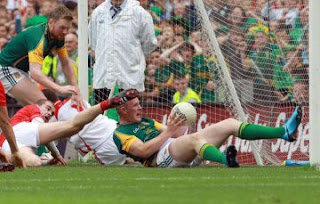(1) Ticket prices need to be lowered as soon as possible:
It seems hard to believe that only 25 years ago, barely 8,000 people attended the 1985 All-Ireland hurling semi-final between Cork and Galway. The subsequent explosion in GAA attendances has been phenomenal.
 |
| GAA tickets: prices need to be lowered in 2011 |
The GAA argues that prices have not risen for five years and say that 82% of ticket revenue is reinvested in counties and clubs. The GAA has also pointed out that if they reduced ticket prices by €5 over one weekend, they could lose about €5million in revenue.
This year though, they need to forget about margins and income streams and understand that no PR strategy will compensate for what is needed now - action. A substantial ticket price reduction before the start of the National Leagues and Championship would be a very good start for fans of gaelic games.
(2) Payments to managers issue needs to be resolved:
 | ||
| Does Anthony Daly (above) travel 800 miles a week | for the good of his health? |
"Stories" have revealed that some inter-county managers
get paid €50,000 - €80,000 plus a year for training expenses. Many counties have never paid their managers anything other than legitimate expenses, so this is something which is difficult to police. One wonders if Dublin hurling manager Anthony Daly travels 200 miles a few times a week (from Clare to Dublin) as Dublin hurling manager for the good of his health however?The GAA has three options: (i) continue to sweep the issue under the carpet, (ii) allow the position of senior inter-county manager to become a full-time paid postion or (iii) introduce an extra allowance to take into account what they have to put in to manage an inter-county squad.
(3) Proper medical facilities at all grounds:
This is unlikely to happen in all grounds but will always be relevant. Most key venues are well supplied with medical equipment, but not every venue is equipped to deal with emergencies. For the effort players put in - they deserve proper care. At some venues, there isn't even a stretcher on-site.
Recently, Oliver Plunketts footballer Seaghan Kearney suffered a cardiac arrest, and the defribilator, which had been in situ since 2004 after the death of Cormac McAnallen, was almost out of power. Luck was on his side though, as there was just enough power to save the player's life.
At the moment, there's too much of a laissez-faire attitude to health and safety in the GAA.
(4) Scrap the winter training ban:
 |
| GAA: bans squad training in November & December |
 |
| FLASHPOINT: 2010 Leinster Final "goal": Meath v Louth |
Goal line technology needs to be introduced for decisions where there is no element of opinion invloved: e.g. it was a goal/wasn't a goal. While the scenes of assault on the referee by losing Louth fans at the final-whistle of the 2010 Leinster Football Final (where Meath scored a goal that had at least three clear infrigements) were wrong, having video technology used in top-level matches could help improve things and reduce flashpoints.


No comments:
Post a Comment